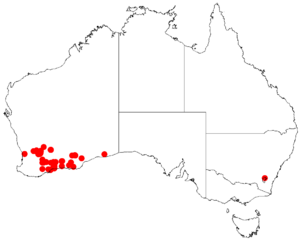Acacia verricula facts for kids
Quick facts for kids Acacia verricula |
|
|---|---|
| Scientific classification | |
| Genus: |
Acacia
|
| Species: |
verricula
|
 |
|
| Occurrence data from AVH | |
Acacia kalgoorliensis is a type of shrub that belongs to the Acacia plant family. It is a special plant because it only grows naturally in a specific part of southwestern Australia. This means it is an endemic species.
What Does It Look Like?
This shrub usually grows to be about 0.5 to 3 meters (1.6 to 9.8 feet) tall. It has a spreading shape, and its small branches are often hairy and a bit sticky from resin.
Like most Acacia plants, it does not have true leaves. Instead, it has special leaf-like parts called phyllodes. These phyllodes are smooth or slightly hairy and feel a bit like thin leather. They can be narrow or wider in the middle, and are usually straight or slightly curved. They often have two or three main veins that you can sometimes see.
The plant's flowers grow in small groups called inflorescences. These groups are usually 1 to 6 millimeters (0.04 to 0.24 inches) long. Each group has round flower-heads, about 4 to 5 millimeters (0.16 to 0.20 inches) across. Each flower-head contains 25 to 35 golden-colored flowers.
After the flowers bloom, shiny, sticky seed pods form. These pods are mostly wavy and shaped like a bow. They can be up to 5 centimeters (2 inches) long and 2 to 4 millimeters (0.08 to 0.16 inches) wide. Inside, they hold glossy brown seeds that are oval-shaped and about 3 to 3.5 millimeters (0.12 to 0.14 inches) long.
Where Does It Grow?
Acacia kalgoorliensis is found in different spots along the south coast and on islands of Western Australia. You can find it in the southern parts of the Wheatbelt, Great Southern, and southern Goldfields-Esperance regions.
Its range stretches from places like Trayning and Chiddarcooping Hill in the north. It goes down to the Fitzgerald River National Park in the south. To the east, it reaches as far as Buningonia Spring and Sparkle Hill. Some plants have even been found further east near Madura. This plant likes to grow in soils that can be loamy, sandy, or clay, and sometimes they are quite gravelly.

